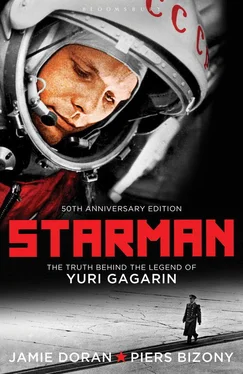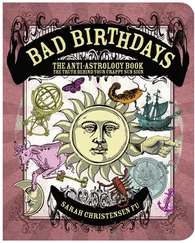Gagarin became so absorbed in his work that he spent long periods staying at the Academy’s hostel, instead of with Valya and the children. But the pursuit of academic excellence was not the only thing keeping him away from home.
Gagarin also spent a good deal of time at the Yunost Hotel, just outside the western perimeter of Moscow’s Garden Ring road. The Yunost was associated with the official communist youth movement, ‘Komsomol’. Gagarin was always welcome there, and room 709 on the seventh floor was kept in reserve for him, funded on a semi-permanent retainer by the Komsomol. On frequent occasions, banquets and receptions would be held at the Yunost for Komsomol delegations visiting Moscow from other republics in the Union, and Gagarin would be expected to attend and give rousing speeches. Often the parties would drag on until the early hours of the morning, at which point it seemed best for Gagarin to sleep at the Yunost, instead of struggling home through the freezing Moscow nights. In the relative informality and privacy of the hotel, he could relax and entertain his friends. An excellent billiards player, he seldom lost, except on one notorious occasion when he surrendered a game to ‘Nona’, a young chess champion noted for her attractive appearance. Gagarin’s male companions could not understand how he could bear the humiliation of losing to a girl, but he had another game in mind.
Gagarin was a fit and handsome young man, who also happened to be the most famous and desired star in the world, with the possible exception of the ‘fab four’ young lads of the Beatles pop group; but it would be a mistake to think of him as a heartless womanizer. He was neither more nor less a sexual adventurer than any other superstar might have been in his circumstances. By all accounts, he loved Valya and was utterly devoted to his two little children. But Valya was not content for her husband to take his wedding vows casually. A single act of adultery was sufficient to upset her, let alone the ‘several’ that must certainly have occurred throughout the couple’s married life.
On one occasion Valya decided to visit her errant partner at the Yunost Hotel. Gagarin’s favourite barber at the Yunost, Igor Khoklov, blames lax security at the front desk for what happened next. ‘It was a different era in those days. Any woman would have jumped on Gagarin, walked with him, slept with him, even. He had a few opportunities at the Yunost. After a party when he was tipsy, a leading sportswoman, a ski champion, took an interest in him. He didn’t seduce her, she seduced him, but around six o’clock his wife arrived. Perhaps she’d had some kind of premonition? I would say the military police [at the front desk] were at fault, because they could easily have telephoned up to Yura’s room to warn him, but they didn’t. And she created an uproar, she really tore Gagarin apart. The other girl just picked up her clothes and ran. I’d say that sportswoman really cost Gagarin dear.’
For Valya, this must have seemed all too familiar – the bang on the door, the arguments, the wounds to her husband’s face (this time caused by her own nails, rather than by a jump from a balcony). Next morning Khoklov had to disguise the scratches on Gagarin’s cheeks prior to a meeting with Khrushchev. Khoklov recalls, ‘I did his make-up. I was licking his wounds, so to speak. He was the kind of a man who had a taste for women, but I wouldn’t say he was throwing himself around left and right. Valentina loved her husband very much, but because of all the things that had happened, she was very jealous. Plus the fact that she caught him.’
Gherman Titov says, ‘It was very difficult for Yura’s wife to get used to the fact that he didn’t really belong to her any more.’
One of the restraining influences on Gagarin’s behaviour after Foros was the bodyguard assigned to him, on Khrushchev’s orders – a tall, sour-faced man nicknamed the ‘polecat’, who immediately dampened the mood of any room he walked into, although he was apparently very nice, once one got to know him. By 1962 Gagarin had persuaded Khrushchev to withdraw the guard, but he had merely replaced him with three rather poorly disguised undercover followers. Khoklov says, ‘If Gagarin liked a woman he couldn’t go with her. You can’t put the bodyguards in the same bed. If you want a drink, it’s just the same. You have to buy a drink for the bodyguards.’
The other major factor was sheer pressure of work, not only at Zhukovsky but also at Star City, and during official ceremonial and propaganda functions. These were reduced in the Brezhnev era but by no means eliminated. Khoklov recalls Gagarin arriving for a haircut one day and commenting about a drunken tramp lying on the street outside, who had soiled his trousers. Exasperated by his relentless schedule, Gagarin joked bitterly, ‘That’s an intelligent fellow over there. He finds an opportunity to rest and do all the other stuff at the same time.’
Igor Khoklov was often despatched to the Kremlin to cut Khrushchev’s hair. The wily old barber retains an unflattering memory of the endless KGB staffers and secret policemen he encountered in those days. ‘I was in the room with Khrushchev and his special bodyguard, who kept his hand in his pocket where he hid his gun. I was thinking, “Who’s faster, you with your gun or me with my razor?” A senior manager then came in, a good bloke, Armenian I think. He saw the guard and said, “We trust the barber. With Igor here, a guard isn’t needed.” So the guard had to go and wait outside the door.’
And it wasn’t Igor the barber, but Khrushchev’s closest political colleagues who eventually cut his throat.
Khrushchev demonstrated that the Soviet Union was a modern technological nation, a powerful player on the world stage, with its missiles, space rockets, satellites, computers, jet planes, aircraft carriers and nuclear weapons. His weak spot – as for so many Russian leaders before or since – was providing the people back home with the most basic necessity of life: food. In the autumn of 1963 he was forced into an embarrassing series of emergency measures, buying wheat from America to make up for the poor harvests yielded by his over-ambitious and under-planned ‘Virgin Lands’ grain-planting programme.
In a similar manner to President Kennedy in the US, Khrushchev looked to the glamour of space to divert attention from his failures. On October 12, 1964, Korolev made good on his promise, successfully launching Voskhod I with three crewmen aboard. Vladimir Komarov, Konstantin Feoktistov and Boris Yegorov were denied ejection seats in the cramped cabin, and there was not even room for them to wear spacesuits. Instead, they had to make do with simple cotton coveralls. However, the Voskhod incorporated some useful improvements on the old Vostok design. There was a back-up retro-rocket pod at the front of the craft, just in case the primary unit failed, and the re-entry capsule had a slightly flattened underside with a cluster of small rockets to soften its impact with the ground, thereby allowing the crew to stay aboard all the way to touchdown. Soviet spokesmen proudly heralded this new ‘soft-landing’ concept, obviously forgetting all the stories they had told about Gagarin’s very different homecoming technique in 1961.
Voskhod I flew too late to benefit Khrushchev. The capsule came home on October 13, and on the very next day the First Secretary was deposed. In fact, he was called away from his retreat at Foros even as the flight was in progress. In Moscow a special meeting of the Politburo informed him, much to his surprise, that he had just resigned due to age and increasing ill-health. Khrushchev’s deputy Leonid Brezhnev took advantage of the unresolved grain crisis to take over as First Secretary. Khrushchev’s faithful aide Fyodor Burlatsky says today, ‘Never mind the coup which happened recently during Gorbachev’s time. This was a real coup, prepared by the KGB and Brezhnev against Khrushchev and against anti-Stalinism.’
Читать дальше












